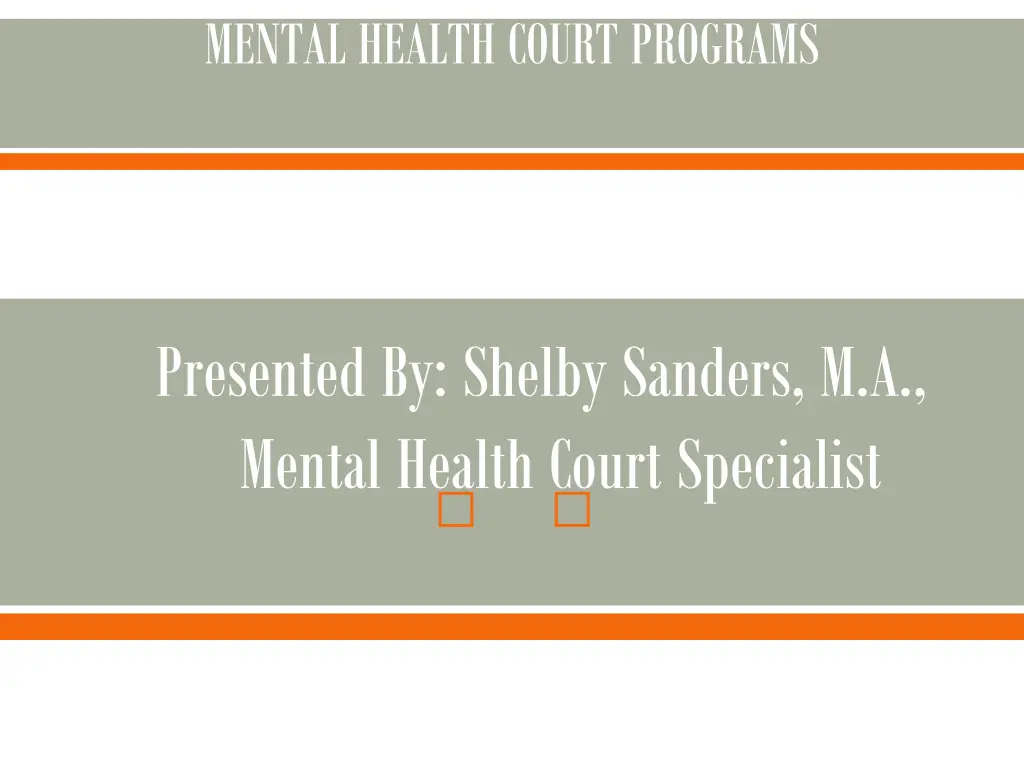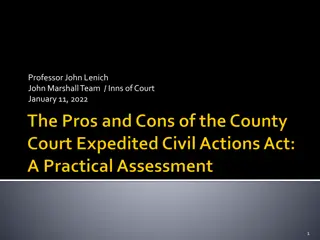
Understanding Mental Health Court Programs
Explore the Mental Health Court Programs in the 13th Judicial Circuit Court presented by Shelby Sanders, M.A., Mental Health Court Specialist. Learn about services provided, referral processes, evaluation methods, and the overall impact of these programs on individuals with mental health challenges. Gain insights into the MHPTI Program and the importance of collaboration between treatment providers and the court for effective communication and support.
Download Presentation

Please find below an Image/Link to download the presentation.
The content on the website is provided AS IS for your information and personal use only. It may not be sold, licensed, or shared on other websites without obtaining consent from the author. If you encounter any issues during the download, it is possible that the publisher has removed the file from their server.
You are allowed to download the files provided on this website for personal or commercial use, subject to the condition that they are used lawfully. All files are the property of their respective owners.
The content on the website is provided AS IS for your information and personal use only. It may not be sold, licensed, or shared on other websites without obtaining consent from the author.
E N D
Presentation Transcript
MENTAL HEALTH COURT PROGRAMS 13th Judicial Circuit Court Presented By: Shelby Sanders, M.A., Mental Health Court Specialist
Shelby Sanders Personal Info Have worked in mental health for almost five years, in areas including substance abuse, mental health, homeless services and forensic services. Graduated from USF with a Masters of Art in Rehabilitation and Mental Health Counseling in 2009. Registered as a Mental Health Counselor Intern & receive weekly supervision from a clinical supervisor as a condition of state licensure. Have personal experience with MI so I know how you feel as family members!
Objectives Learn about Mental Health Services provided through court programs Be able to access information about mental health court programs including forms, referrals, resources, etc. Provide feedback to the Administrative Office of the Courts about improvements for communication between treatment providers and the court
MENTAL HEALTH PRE-TRIAL INTERVENTION MHPTI Evaluations, Process, Agreements, and Reporting Instructions
MHPTI Program Overview Referrals come from the client s Attorney (Public Defender or Private) and is agreed to be offered by the State s Attorney office. Therefore, the State Attorney MUST agree to offer the arrangement. MHPTI is a program offered for first time felony offenders (with less than two prior misdemeanors) who have a history of mental illness OR who are expected to have a mental illness.
Referral Process MHPTI referral form needs to be submitted to Mental Health Court Specialist for evaluation of the defendant in order to screen for mental health issues; note defendant resources and supports in the community and link to necessary mental health services. Evaluation can be set up at Public Defender s building, Private attorney s office, court (if necessary), or can be done at the jail while the defendant is still in custody. Evaluation can take any where from 45 minutes to an 1.5 hours depending on the defendant and what services he or she is already linked to.
Role Play Review process FACE Sheet/MH Evaluation Did you think this was an effective means of gathering information? What other information would you like to see gathered to understand the client?
Consent/ROIs In order to be eligible, the defendant must consent to participate in this program voluntarily and be willing to sign releases of information in order for the Mental Health Court Specialist to make appropriate referrals to mental health agencies and/or get in contact with the defendant s mental health provider. This is a necessary step to the process! There must be communication between the court and the treatment provider in order to follow through with MHPTI. What ideas do you have to engage treatment providers to participate in the MHPTI program?
MHPTI Agreement This is actually an agreement that needs to be signed! It works like a contract and is agreed upon in court. Parties involved include: the defendant, the defendant s Attorney, the State Attorney, the Treatment Provider, and the Probation Officer. Time on MHPTI does not start counting until all parties have signed the agreement. Typically this is done the same day as court and the defendant is required to report to the Pre-Trial Intervention office to go over this information with their assigned Probation Officer.
Agreement Cont. MUST HAVES Defendants must have a stable address to be in the MHPTI program this can be a home, group home, ALF, treatment center or halfway house. Defendants will be responsible for some fees, including restitution, if there is any, as this is a requirement of MHPTI. If there is a victim in the case, there may be a no contact condition while on MHPTI. Defendants are subject to submit to urine analysis while on MHPTI.
Ancillary Contacts With defendant s permission, Mental Health Court Specialist may contact family members, significant others and other interested parties for corroborating information, support and/or treatment planning. Consider all information discovered in developing treatment planning, i.e., arrests, treatment history, family input, hospitalizations.
Treatment Providers The defendant will need to be in treatment throughout the time on MHPTI. The treatment provider must be willing to cooperate in the reporting process for the purpose of the MHPTI agreement. The Agreement will need to be signed by the treatment provider so the court can monitor that the client is receiving mental health treatment while in the community.
Treatment Cont. Reporting process is EASY! There is a template form for the treatment provider to fill out and fax to the Department of Corrections once per month in order to keep informed how their client is participating in treatment. No specific treatment details are asked for in the monthly report, only if the client is attending treatment and if he or she is taking medications as prescribed by the attending physician. The agreement does not lock the defendant into selecting one particular provider; the defendant may chose to switch providers at any time and hopefully the new provider is willing to take part in the MHPTI monthly reporting, which is necessary to be on MHPTI.
MHPTI Program Statistics A total of 41 defendants were screened for the MHPTI program, resulting in 26 accepted in 2011. Out of the 26 cases accepted, 27% of the defendants were diagnosed with a psychotic disorder. Out of the 26 cases accepted, 42% of the defendants were diagnosed with a mood disorder. Out of the 26 cases accepted, 23% of the defendants were diagnosed with an anxiety dosirder. The remaining 8% of the cases, were placed in an other category as their diagnosis did not fall into the other 3.
MHPTI Program Statistics Of the 26 cases that were accepted into the PTI program, 19% of the Defendants had a past history of military involvement ranging from service in the Marines, Army and Navy branches. Of the 26 cases that were accepted into the MHPTI program, 27% of those individuals were homeless as a result of the legal charges and needed assistance securing stable housing. Of the 26 cases that were accepted into the MHPTI program, 31% were considered to have been dual-diagnosis clients and as a result were linked to both mental health services as well as substance abuse services, either in an inpatient or outpatient capacity.
Additional Program Rules If the arrest involves a victim of some kind (ex. Domestic violence dispute, law enforcement or another agency) the victim must consent to the defendant participating in this program. If the defendant s living arrangements change during the course of the MHPTI program, the defendant MUST get approval by the supervising Probation Officer AND the State Attorney s office in order to move to an alternate address. Some defendants will be required to submit to random urine analysis either with the treatment provider or the supervising officer (Ex. Drug offenses).
TO FINISH! Defendants who successfully participate in all mental health services and conditions of the Pre-trial Intervention for a period of 9 months will be allowed to automatically terminate from the program and the charges will be dismissed! This will be coordinated through the PTI office and the PO and the defendant will not need to come back to court charges DISMISSED! If there is a violation for any reason, the defendant will come back to court and the ASA will decide whether to renter the program or revoke MHPTI. If there is a violation and the defendant is allowed back into the program, he or she will be required to complete the entire 18 months no option to early terminate, but if do complete successfully the charges will still be dismissed!
Mental Health Court Case Management Services Coordinated for various Divisions
Referrals & Evaluations Various Divisions within the 13th Judicial Circuit Court will need assistance linking defendants to mental health treatment as a condition of their release from jail. The Mental Health Court Specialist can assist with these defendants by going to the jail to engage the defendant in a mental health evaluation; this is the same evaluation performed with MHPTI defendants; however, with a different goal in mind. There is no longer an option of a Pre-trial Intervention program once the defendant has had multiple arrests, however their release from jail may be dependent upon engaging in mental health services.
Criminal Court Program Statistics A total of 55 cases were screened and referred to mental health services in 2011. Out of the 55 cases screened, 20% of the cases were diagnosed as having a psychotic disorder. Out of the 55 cases screened, 49% of the cases were diagnosed as having a mood disorder. Out of the 55 cases screened, 11% of the cases were diagnosed as having a anxiety disorder. The remaining 20% of the cases were placed in an other category as their diagnosis did not fall within the other 3.
Statistics Continued Of the 55 cases that were referred, evaluated and linked to services, 5% of the Defendants had a past history of military involvement. Of the 55 cases that were referred, evaluated and linked to services, 45% of the Defendants were homeless upon entry into the jail or lost their housing during their length of stay in the jail. These clients were either linked to residential treatment centers or were found stable housing in the community. Of the 55 cases that were referred, evaluated and linked to services, 80% were diagnosed as having both a mental illness and substance abuse or dependency issues while 20% claimed no history of using substances during the initial evaluation. The majority of those using substances
Referral Process Criminal Court You guessed it Most referrals will come from Public Defenders or private attorneys who are aware of Mental Health Court Specialist services with the court. Parents/family members have contacted Mental Health Court Specialist about their loved one in jail as a result of finding contact information on the court website. However, as you are aware Mental Health treatment is private! Hence the need for ROI s even to talk to a spouse or a parent. Best directive is to get in contact with the defendant s Attorney, advise them of the information you located on the website and have them contact Mental Health Court Specialist.
Services Coordinated Outpatient Defendant can be linked to a variety of outpatient services, including mental health counseling of various types, medication management, case management, housing, and health care related services. Defendant must meet program criteria to be eligible for program benefits. Inpatient Some defendants are eligible to enter inpatient treatment for both substance abuse and mental health services. Referrals are provided by Mental Health Court Specialist, however treatment programs still need to review defendants application.
In-Jail Services Some defendants may be eligible to complete the in-jail treatment program. Faulkenburg Road Jail offers a variety of programs including: substance abuse, anger management and domestic violence classes. Education classes are also available for defendants to work towards GED requirements. Jail does have psychiatric services; clients who have an active prescription upon entering the jail will be provided a comparable medication to what he or she has been prescribed. All individuals who are arrested will be screened by psych upon admission into the jail.
Comparison of Programs MHPTI Case Management Can get charges reduced/dismissed with the condition that the program is completed. Must stay on for at least 9 months then would be eligible for early termination. Normal length of term is 18 months. Charges do not get dismissed or reduced/most likely already a felony offender. Client would need to be responsible to keep themselves in treatment for the success of their probation term.
Website Info Check it out! www.fljud13.org has all of the MHPTI program info on it. Click on Court Programs on Right side of screen, Mental Health Case Management Programs toward the top of the screen, use the Navigation Tool bar on the left to locate various information. Mental Health Court Specialist contact info is also located there.
THE END! Please feel free to contact me anytime ask for my card!






















